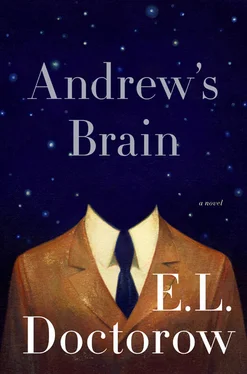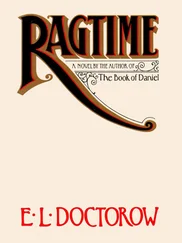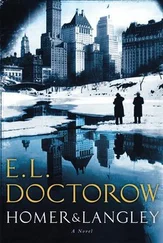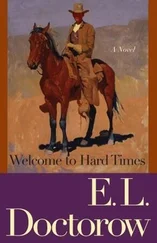Later, Andrew didn’t remember if he heard the bells of Moscow in celebration of the tyrant’s death, because he was out of there, slipping into his jacket as he ran and catching a cab to Union Station and getting on a Metro-liner.
In New York, he walked crosstown to Grand Central and in a shop there bought a toy animal for his Willa, a funny, eye-rolling mechanical puppy who could be wound up and set down to wobble along on his little legs. He thought an animal was the safest thing to give his daughter, who would be three years old by now. Any child from one to ten would enjoy a toy animal.
You see, Doc, it all came back to me in a rush — Martha’s house, Martha’s large husband — not that I thought he was the Boris who had died that afternoon — I had the impression that he was no longer top-drawer in the opera world — but the house, the scene, Martha walking up the staircase with my baby in her arms. It was as if not a moment had passed and I was still at their front door rubbing the snow from my glasses. And as the commuter train rocked its way to New Rochelle I was no longer afraid how my visit would turn out, no longer adrift in indecision, creating ominous scenarios in my mind. I was going to see my daughter! I felt love for Martha and for Martha’s husband, I was overflowing with gratitude to these people who had taken my baby with Briony under their wing. And I found I was even happy with the rickety train ride.
You’re going to tell me this didn’t end well.
Of course.
When Andrew arrived at Martha’s house he knew immediately something was wrong. The snow had been cleared from all the other driveways and front walks on her street, but Martha’s property had not been touched. Andrew paid the cabbie and stood with his feet in six inches of snow. The thing about Martha, one of the definitive things, was her impeccable home management. If something didn’t work, no matter how incidental, she must have it fixed instantly. She brought forth gardeners, plumbers, electricians, carpenters, painters, roofers, tilers, cleaners, glaziers, and repairmen with esoteric specialties. She tended with solemnity to such details as brass door keyhole covers. It was now eight in the evening of a grim November day. Lights were on in the neighborhood, but the house in front of him was dimly lit as if some sort of séance was going on. I don’t know why Andrew thought that. He trudged up the path to the front door and found it ajar. [ thinking ]
Yes, go on.
He called me The Pretender.
Who?
Martha’s large husband. That was his greeting. Ah, he said, here’s The Pretender. That was the name he’d devised for me when we’d had that drink the day I brought the baby to their door. That I only pretended to be a nice human being generously disposed to my fellow man when in fact I was a dangerously fake person, congenitally insincere and a killer — that’s how he characterized me. Andrew the Pretender. And, as I told you, he was not far from the truth. But now when he called me The Pretender I realized whose portrait was up there over the mantel of the living room. It was Martha’s husband in his greatest role when he was still active — Boris Godunov. Now, you of course know the story of Boris Godunov.
I’m ashamed to say—
Boris is a kind of Russian Richard the Third. Kills the rightful heir to the throne, the czarevich Dmitry. Slits the kid’s throat and declares himself czar. Thereafter, he’s tormented by what he has done. Post-traumatic stress disorder.
OK.
So the years pass and an opportunistic monk, Grigoriy, seeing that he’s about the same age as the dead czarevich would have been, goes off to put together an army on the Polish-Lithuanian border. He will advance on Moscow announcing himself as the czarevich Dmitry, the rightful heir to the throne. Boris Godunov is assured that the man is a pretender — that the real czarevich is still dead. But afflicted with guilt, and riddled with religious superstition, Boris can’t convince himself that this is so, and he dies. That’s the story.
Interesting, but why—
Except for some Holy Fool at court who is heard lamenting Russia’s fate as the curtain comes down. Lots of Holy Fools in Russia in those days. You get Fools in Shakespeare too but they’re not particularly holy. A Russian Fool is automatically holy. He was drunk, of course.
The Fool?
Martha’s large husband. Sprawled in an armchair in full czarist regalia, dethroned as Boris Godunov, dethroned as Martha’s husband. Because I knew she wasn’t there, not with the house in this condition. Not with him in this condition. I didn’t know opera singers owned their costumes — they don’t, do they? Yet there he was in that heavy tapestry robe and that knitted crown they affected with the jeweled trimming and the little cross on top. He lifted his glass: To The Pretender, he said, looking at me, and then because he hiccupped his arm jerked back and the contents of his glass made a lovely arc through the air and hit his portrait on the wall behind him, splashing over his face made up as Boris Godunov so that the painting seemed to be shedding tears.
Did this really happen?
What?
Your impulsively going to New Rochelle because you’d heard Boris Godunov on the radio and then finding this czarist simulacrum lying around drunk?
I’m not angry at you for asking that question because I hardly believed it myself standing there in that dark living room, which incidentally was unheated, which may have been the reason Martha’s large husband had put on that heavy regalia complete with that watch cap of a crown. And, after all, might he not have been listening with some bitterness to the same Saturday broadcast? I stood over him as he looked at me with bleary half-focused eyes. He had lost weight and was no longer the intimidating figure he’d been. He’d been a big humpy manatee of a man, huge and sleek. No more. The double chin, the wide face, the big head, it was all thinned out now, the physiognomy, with his jawline like a wishbone and the hollow cheeks with eyes staring up at me that belonged to a very sick man. I found myself furious, totally unsympathetic, and spoke to him as one speaks to a drunk.
Where is she, where’s Martha, goddamn you, where’s my child?
He staggered to his feet and began to sing the dying scene in his raspy bass, holding his arms out to me.
I ran upstairs, looked in all the rooms. An empty crib, open empty drawers, empty closet. In the master bedroom a rumpled bed, one closet with just the hangers hanging there. On the floor, some scraps of paper. A folded-up bus schedule. Ras-chee-chev. Ras-chee-chev . [ thinking ] Listen, I want to correct the wrong impression I may have given you about my feelings for Briony.
Wait a minute — what did you do then?
What?
After you found Martha gone.
I caught the last train back to Washington. That poor drunk had no more idea where she was than I did. He couldn’t even tell me how long she’d been gone. I had the feeling looking around that it had been a while. Of course the kid would be safe with her. She’d left her piano. It was still there in the study. That meant to me Willa was now her life. But there was no rush, this was not an emergency, if I hadn’t impulsively taken that trip I would really have been in the dark. So relatively speaking I was up on things.
And there was a little bit of relief there too, do you suppose?
Well, why not? I’m not ashamed to say it. What is more daunting than a judgment in the eyes of a child? It would come eventually, inevitably. It just wouldn’t be now. But I was trying to tell you something.
Yes?
See, the door was open and there I stood. So to a man, an opera singer costumed as Boris, and seriously drunk, singing the role there in his living room — what could be more reasonable than for Boris to see the fellow standing at the door as the Pretender Grigoriy, with his Polish-Lithuanian army, arrived to take the crown. I had thought he was talking about me, and maybe he was but somehow now also putting me in the opera. I was the false claimant to the throne, you see?
Читать дальше











